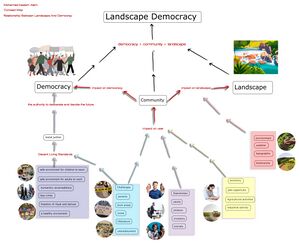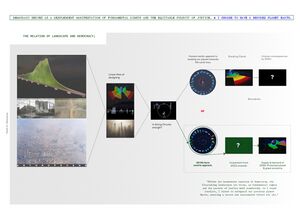Democratic Landscape Transformation 2023 - Team 3: Difference between revisions
Ola23team3 (talk | contribs) |
Ola23team3 (talk | contribs) |
||
| Line 57: | Line 57: | ||
*add as many additional materials as you need | *add as many additional materials as you need | ||
<gallery widths="400" heights="200" perrow="4"> | <gallery widths="400" heights="200" perrow="4" caption="[[File:Conceptmap-mohamedkassim alam .jpg|thumb]]"> | ||
File:Index.php?title=File:Index.php?title=File:Index.php?title=File:Conceptmap-mohamedkassim alam .jpg|'''Mohamed kassim Alam''', the relationship between landscape and democracy | File:Index.php?title=File:Index.php?title=File:Index.php?title=File:Index.php?title=File:Conceptmap-mohamedkassim alam .jpg|'''Mohamed kassim Alam''', the relationship between landscape and democracy | ||
File:Index.php?title=File:Index.php?title=File:Index.php?title=File:Index.php?title=File:Addyourfilename.jpg|[[File:AR.Parth Khimjibhai Ghevariya, The Relationship Between Landscape and Democracy.jpg|thumb|"Within the harmonious tapestry of democracy, the flourishing landscapes are woven, as fundamental rights and the pursuit of justice meld seamlessly. As I stand resolute, I choose to safeguard our precious planet Earth, ensuring a secure and sustainable future for all."]]'''AR.Parth Khimjibhai Ghevariya,''' The Relationship Between Landscape and Democracy | File:Index.php?title=File:Index.php?title=File:Index.php?title=File:Index.php?title=File:Index.php?title=File:Addyourfilename.jpg|[[File:AR.Parth Khimjibhai Ghevariya, The Relationship Between Landscape and Democracy.jpg|thumb|"Within the harmonious tapestry of democracy, the flourishing landscapes are woven, as fundamental rights and the pursuit of justice meld seamlessly. As I stand resolute, I choose to safeguard our precious planet Earth, ensuring a secure and sustainable future for all."]]'''AR.Parth Khimjibhai Ghevariya,''' The Relationship Between Landscape and Democracy | ||
File:Index.php?title=File:Index.php?title=File:Index.php?title=File:Index.php?title=File:Addyourfilename.jpg|one caption per author | File:Index.php?title=File:Index.php?title=File:Index.php?title=File:Index.php?title=File:Index.php?title=File:Addyourfilename.jpg|one caption per author | ||
File:Index.php?title=File:Index.php?title=File:Index.php?title=File:Index.php?title=File:Addyourfilename.jpg|one caption per author | File:Index.php?title=File:Index.php?title=File:Index.php?title=File:Index.php?title=File:Index.php?title=File:Addyourfilename.jpg|one caption per author | ||
</gallery> | </gallery> | ||
Revision as of 01:23, 5 July 2023
>>> Back to working group overview
>>> Back to seminar reading list
>>> go to the Editing Help
Background of your team
- Please write a few words about your team.
- Which linguistic and cultural perspectives are you representing? Which disciplinary backgrounds?
- Mohamed Kassim Alam: I obtained my bachelor's degree from Egypt in Architectural Engineering, I started with designing some commercial and residential buildings ,then I worked in the industrial architecture which I found interesting as you need to be able to have an ahead vision before the problem happens and have the flexibility to deal with any unexpected variants in the project .
- Ar. Parth Khimjibhai Ghevariya: I'm on track, looking for an environment full of those "thundering clouds," The mist of it hitch-hikes my impulse to the core. I have tons of energy, borrowed seeds, & common sense. I am willing to roll my sleeves up, dig down, & plant the "seed," which will be the architecture/design for nature's rehabilitation.
Your Landscape Democracy Manifestoes
Here you can add links to the manifestoes you have presented on April 26
- Mohamed kassim Alam, Manifesto
- AR. Parth Khimjibhai Ghveariya, Manifesto
- Aniseh Saber, Manifesto
- add link here
Examples of Landscape Activism
In the session on May 10 you will discuss examples of landscape activism from your own contexts. You can share the examples in this section (link, image and/or short explanation).
- Mohamed kassim Alam, landscape Activism
- AR. Parth Khimjibhai Ghevariya, Landscape Activism - With unwavering determination and a deep love for the environment, Jadav Payeng has single-handedly transformed a barren landscape into a thriving ecosystem, serving as an inspiration to us all. Let us delve into the incredible journey of this environmental hero and the lessons we can learn from his activism.
- I. The Birth of an Environmental Crusader:
II. The Forest Man Rises:A. Early life and connection to nature: Jadav Payeng's upbringing in the rural region of Assam, India. His profound affinity for the natural world and its diverse inhabitants. B. Witnessing devastation: The ecological crisis that struck Majuli Island. The loss of vegetation, wildlife, and the threat to local communities.
III. Environmental Impact and Conservation Legacy:A. One man's mission: Jadav Payeng's resolute decision to make a difference. His vow to restore and rejuvenate the island. B. The planting campaign: Tirelessly planting trees year after year. Overcoming challenges and inspiring others to join his cause. The remarkable scale of his efforts, resulting in a forest spanning over 1,300 acres.
IV. Lessons for Environmental Activism:A. Biodiversity revival: The return of native flora and fauna to the region. The forest becoming a sanctuary for animals, including tigers, elephants, and migratory birds. The restoration of the island's delicate ecosystem. B. Climate change resilience: The forest's role in carbon sequestration and mitigating climate change. Protection against erosion and natural disasters. The significance of Payeng's activism in the face of global environmental challenges.
Conclusion: In conclusion, Jadav Payeng's activism serves as a shining beacon of hope and inspiration. His unwavering commitment to restoring the natural environment through his reforestation efforts on Majuli Island has created a lasting legacy. Payeng's achievements remind us that every individual has the power to make a difference, no matter how small or vast the scale may be. Let us take Jadav Payeng's example to heart and become catalysts for change, working towards a greener future for ourselves and generations to come.A. The power of one: Jadav Payeng's remarkable example of individual action leading to collective impact. Encouraging others to take ownership of environmental issues in their communities. B. Long-term commitment: Payeng's persistence and dedication spanning over four decades. The need for sustained efforts and ongoing activism to combat environmental degradation. C. Education and awareness: Promoting environmental education to empower future generations. Inspiring others to appreciate and protect nature's invaluable resources.
- I. The Birth of an Environmental Crusader:
The Role Play
In the session on May 17 you will present a small role play with your team. Please add here a short reflection on what you have learned from this play. The short list of landscape democracy 'movers and shakers' can be found here
- Mohamed kassim Alam, The Role Play
- Jadav Payeng (AR. Parth Khimjibhai Ghevariya) - If I were to play the role of Jadav Payeng, responding to the current situation of global warming and the critical state of forests, I would embody his values and approach through the following points:
- Deep concern and sense of responsibility:
Inspiring awareness and education:Express genuine concern about the escalating global warming crisis and the critical state of forests worldwide. Recognize the urgency of the situation and the need for immediate action.
Emphasis on reforestation:Advocate for widespread awareness about the impacts of global warming and the importance of forest conservation. Deliver speeches, engage in media interviews, and initiate educational programs to inspire individuals and communities.
Collaboration and collective action:Highlight the critical role of trees and forests in mitigating climate change by absorbing carbon dioxide and releasing oxygen. Encourage and actively engage in planting trees on a global scale to address climate change and preserve biodiversity.
Stronger environmental policies and community involvement:Call for collaboration among governments, organizations, and individuals to work together towards sustainable land management practices. Mobilize resources and foster partnerships for large-scale reforestation initiatives.
Resilience and determination:Advocate for stronger environmental policies and regulations to combat deforestation and promote sustainable land use. Stress the importance of involving local communities in decision-making processes and recognizing their knowledge and rights.
In playing the role of Jadav Payeng, I would draw upon his deep love for nature, his unwavering commitment to action, and his belief in the power of individuals and collective efforts to make a positive impact on our planet's future.Embody resilience and determination in the face of challenges. Persistently advocate for sustainable practices and inspire others through my own actions. Motivate future generations to become environmental stewards.
- Deep concern and sense of responsibility:
>>> All information on the phase B activities is compiled in this PDF
Readings, concepts and definitions
- Start: April 5, 2023
- Due: July 5, 2023
Working in your group, express your personal understanding of the relation of landscape and democracy in the form of a concept map with linking words or any other diagrammatic representation. Please make your maps very visual and not just verbal. Think critically about why one map differs from another
About concept mapping
Before starting the exercise you can read this article by Joseph D. Novak & Alberto J. Cañas about Theory Underlying Concept Maps and How to Construct and Use Them. This paper gives a good explanation of how concept maps are conceived and developed.
You can use any tool you like for producing your concept map. However, since the result needs to be submitted digitally we recommend the following open source software for producing your maps:
- Cmap Tools >>> you can also work with your group on the Cmap cloud doing a shared map
- VUE - The Visual Understanding Environment
Please add your concept map(s) here
- Possible format: JPG (for wiki upload) or link to any other resource
- You may add one map per team member or an integrated one
- add as many additional materials as you need
- Index.php?title=File:Index.php?title=File:Index.php?title=File:Index.php?title=File:Conceptmap-mohamedkassim alam .jpg
Mohamed kassim Alam, the relationship between landscape and democracy
- Index.php?title=File:Index.php?title=File:Index.php?title=File:Index.php?title=File:Index.php?title=File:Addyourfilename.jpgAR.Parth Khimjibhai Ghevariya, The Relationship Between Landscape and Democracy
- Index.php?title=File:Index.php?title=File:Index.php?title=File:Index.php?title=File:Index.php?title=File:Addyourfilename.jpg
one caption per author
- Index.php?title=File:Index.php?title=File:Index.php?title=File:Index.php?title=File:Index.php?title=File:Addyourfilename.jpg
one caption per author
Please finish with a short reflection
- What are the similarities and differences in your team regarding your understanding of what democratic landscape transformation is?
- In how far did the seminar lectures and readings help you to clarify this?
- What will you take home from this seminar?

